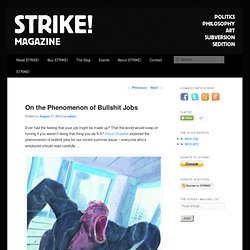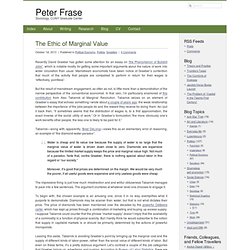

The Expendables: How the Temps Who Power Corporate Giants Are Getting Crushed. Temporary Work, Lasting Harm. Ninety minutes into his first day on the first job of his life, Day Davis, pictured above, was called over to help at Palletizer No. 4 at the Bacardi bottling plant in Jacksonville, Fla.

Above is a composite image of the times Davis is seen in a surveillance video before an all-too-common story for temp workers unfolded. After getting his high school diploma, completing federal job training and sending out dozens of applications, Day Davis, 21, got a job. A two-tiered employment world. Should we worry about 'unproductive' financial sector gobbling up our best? Are too many of our most talented people choosing careers in finance – and, more specifically, in trading, speculating, and other allegedly unproductive activities?

In the United States, 7.4% of total compensation of employees in 2012 went to people working in the finance and insurance industries. Whether or not that percentage is too high, the real issue is that the share is even higher among the most educated and accomplished people, whose activities may be economically and socially useless, if not harmful. On the Phenomenon of Bullshit Jobs.
Ever had the feeling that your job might be made up?

That the world would keep on turning if you weren’t doing that thing you do 9-5? David Graeber explored the phenomenon of bullshit jobs for our recent summer issue – everyone who’s employed should read carefully… The Ethic of Marginal Value. Recently David Graeber has gotten some attention for an essay on “the Phenomenon of Bullshit Jobs”, which is notable mostly for getting some important arguments about the nature of work into wider circulation than usual.

Mainstream economists have taken notice of Graeber’s contention that much of the activity that people are compelled to perform in return for their wages is “effectively, pointless”. But the result of mainstream engagement, as often as not, is little more than a demonstration of the narrow perspective of the conventional economist. In that vein, I’m particularly enamored of this contribution from Alex Tabarrok at Marginal Revolution. Tabarrok seizes on an element of Graeber’s essay that echoes something I wrote about a couple of years ago: the weak relationship between the importance of the jobs people do and the reward they receive for doing them.
The Myth of Executive Stress. It’s tough to be the boss.

A recent Wall Street Journal article described the plight of one CEO who had to drag himself out of bed each morning and muster his game face. It would be a long day of telling other people what to do. It got so bad, we are told, that he had no choice but to take a year off work to sail across the Atlantic Ocean with his family. Listen to Britney Spears – work is the new religion. Launched in September 2013, Britney Spears' latest single Work B**ch is the most recent production in the new genre of motivational work music.

Spears' lyrical efforts (You wanna live fancy? / Live in a big mansion? / Party in France? Nonsense bullshit jobs. Illustration: Pat Campbell In 1930, John Maynard Keynes predicted that, by century's end, technology would have advanced sufficiently that countries like Britain or the United States would have achieved a 15-hour working week.

There's every reason to believe he was right. In technological terms, we are quite capable of this. And yet it didn't happen. Instead, technology has been marshalled, if anything, to figure out ways to make us all work more. What Is a Good Life? by Ronald Dworkin. Morality and Happiness Plato and Aristotle treated morality as a genre of interpretation.

They tried to show the true character of each of the main moral and political virtues (such as honor, civic responsibility, and justice), first by relating each to the others, and then to the broad ethical ideals their translators summarize as personal “happiness.” Here I use the terms “ethical” and “moral” in what might seem a special way. Moral standards prescribe how we ought to treat others; ethical standards, how we ought to live ourselves. The happiness that Plato and Aristotle evoked was to be achieved by living ethically; and this meant living according to independent moral principles.
Journal of Practical Ethics. Introducing the Journal of Practical Ethics Roger Crisp & Julian Savulescu Journal of Practical Ethics 1(1): 1-2 The Journal of Practical Ethics is a new open access, interdisciplinary journal in applied moral philosophy and related areas of philosophy, including political and legal philosophy.

It is supported by the Uehiro Foundation on Ethics and Education and we are most grateful to the Foundation for making the journal possible. Bulletin of the Atomic Scientists. How Wars Start. Can Hospital Chains Improve the Medical Industry? It was Saturday night, and I was at the local Cheesecake Factory with my two teen-age daughters and three of their friends.

You may know the chain: a hundred and sixty restaurants with a catalogue-like menu that, when I did a count, listed three hundred and eight dinner items (including the forty-nine on the “Skinnylicious” menu), plus a hundred and twenty-four choices of beverage. It’s a linen-napkin-and-tablecloth sort of place, but with something for everyone. There’s wine and wasabi-crusted ahi tuna, but there’s also buffalo wings and Bud Light.
The kids ordered mostly comfort food—pot stickers, mini crab cakes, teriyaki chicken, Hawaiian pizza, pasta carbonara. I got a beet salad with goat cheese, white-bean hummus and warm flatbread, and the miso salmon. Lower Costs and Better Care for Neediest Patients. If Camden, New Jersey, becomes the first American community to lower its medical costs, it will have a murder to thank. At nine-fifty on a February night in 2001, a twenty-two-year-old black man was shot while driving his Ford Taurus station wagon through a neighborhood on the edge of the Rutgers University campus. The victim lay motionless in the street beside the open door on the driver’s side, as if the car had ejected him.
A neighborhood couple, a physical therapist and a volunteer firefighter, approached to see if they could help, but police waved them back. McAllen, Texas and the high cost of health care. It is spring in McAllen, Texas. The morning sun is warm. The streets are lined with palm trees and pickup trucks. McAllen is in Hidalgo County, which has the lowest household income in the country, but it’s a border town, and a thriving foreign-trade zone has kept the unemployment rate below ten per cent. We're having the wrong debate about rising health care costs. By Geoff Colvin, senior editor-at-large FORTUNE -- The central mystery in America's health care crisis is a simple question: Why don't people take better care of themselves?
Like many simple questions, it leads into deep waters. It demands that we confront a profound new reality about health. Most important, it requires us to reframe the debate over paying for health care. That debate will rage when the Supreme Court issues its ruling on Obamacare in June. Our thinking on health care policy is premised largely on a reality that prevailed for nearly all of human history: that ill health is a curse that can be visited upon any of us at any time.
Jeffrey Singer: The Man Who Was Treated for $17,000 Less. William James Proposes the Moral Equivalent of War. Voices in Time The war against war is going to be no holiday excursion or camping party. The military feelings are too deeply grounded to abdicate their place among our ideals until better substitutes are offered than the glory and shame that come to nations as well as to individuals from the ups and downs of politics and the vicissitudes of trade. There is something highly paradoxical in the modern man’s relation to war. RIP Military Historian John Keegan, Who Saw War as Product of Culture Rather than Biology. Why Legalizing Marijuana on Election Day Might Not Be a Good Idea. Voters in two states will decide on Election Day whether ending the prohibition on pot is a good idea. What if foreign policy officials suddenly told the truth. Former McDonald's Honchos Take On Sustainable Cuisine. Photo: James Wojcik. Obesity Pragmatism. Health activists are in a tizzy over sugar and fast food, which they blame for the obesity “epidemic.”
More Evidence of the Link Between Obesity and Food Prices. Freedom to Make the Right Choice NYC and ads and pedagogy Hedgehog Review. The Hedgehog Review: Vol. 15, No. 2 (Summer 2013) Mass Incarceration and Criminal Justice in America. Speech: Democracy and Confinement. Why Mass Incarceration Defines Us As a Society. Cameron Todd Willingham, Texas, and the death penalty. US prison population on the decline. The Strangely Underreported Decline in the Incarceration Rate. Visualizing Punishment » The Society Pages. Cruel and Unusual Punishment: The Shame of Three Strikes Laws. All Politics Is Local, by Daniel Alarcón. Overcrowding in California prisons. II. As a weapon in the hands of the restless poor—By Earl Shorris.
The Lost Tools of Learning. The Elusive Big Idea.
Bill Clinton On Why The World Is Getting Better All The Time. The Philosophy of Data. Bill Moyers: Why U.S. Internet Access is Slow, Costly and Unfair. The Behavioral Sink. Literate Programming. In a Cave. Myth of the Rule of Law faculty.msb.edu/hasnasj/GTWebSite/MythWeb.htm. The Myth of American Meritocracy. Www.americanprogressaction.org/wp-content/uploads/2012/10/Obama-Nobel-Endorsement-Letter1.pdf. Why cops lie. Why Police Officers Lie Under Oath. No one really believes in ‘equality of opportunity’ “Why did you shoot me? I was reading a book”: The new warrior cop is out of control. Life for Captive Elephants.
Dept. of Entomology: Stung. Looking Back on the Limits of Growth. Is it Too Late for Sustainable Development? The Insourcing Boom - Charles Fishman. Paradise regained? Recycling: Can It Be Wrong, When It Feels So Right? WHAT *SHOULD* WE BE WORRIED ABOUT? Can You Fight Poverty With a Five-Star Hotel? World Bank’s IFC Arm Responds to Our Critique of Its Poverty Fighting. Dylan Evans – On evolution and inequality. Blog Archive Wealth Inequality in Motion. « "Money Changes Everything" bookforum special issue summer 2012. Authors@Google: David Graeber, DEBT: The First 5,000 Years. Great Problems: The Rent-seeking Economy. The Surprising Truths About Income Inequality in America: Big Issues. What Makes Countries Rich or Poor? by Jared Diamond. Americans Want to Live in a Much More Equal Country (They Just Don't Realize It) - Dan Ariely.
Charles Murray: Why Capitalism Has an Image Problem. John Quiggin – Prospects of a Keynesian utopia. What do Americans know about inequality? It depends on how you ask them. A Brief History of American Prosperity by Guy Sorman, City Journal Autumn 2012. In the South and West, a Tax on Being Poor. Civil Rights Movement in the United States. Living Apart. Heartwarming causes are nice, but let’s give to charity with our heads. Inequality matters. E. B. White on 'The Meaning of Democracy' The Stone Philosophy Links. J. M. Coetzee - Nobel Lecture: He and His Man.
Margaret Paxson – On peace. Still irresistible, a working-class hero's finest speech - UK Politics - UK. An Ordinary Person's Guide to Overthrowing the Corporate Elites by Chris HedgesThe Occupied Wall Street Journal. Economics is good for lots of things. To Live Is an Act of Courage - Jennifer Michael Hecht.